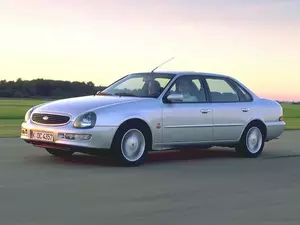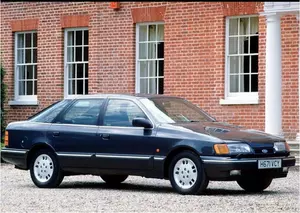
| Vehicle | Precise engine size | Difference from world average | Engine size to consumption ratio | Horsepower from 1 L | Engine size to 100 kg of weight |
|---|---|---|---|---|---|
| 2.0 i |
2 L (1998 cc) |
14.8% smaller | 74 cc to 1 mpg | 58 hp from 1 L | 143 cc to 100 kg |
| 2.0i 16V |
2 L (1998 cc) |
14.8% smaller | 77 cc to 1 mpg | 68 hp from 1 L | 143 cc to 100 kg |
| 2.5 TD |
2.5 L (2500 cc) |
6.6% bigger | 86 cc to 1 mpg | 46 hp from 1 L | 167 cc to 100 kg |
| 2.3i 16V |
2.3 L (2295 cc) |
2.2% smaller | - | 64 hp from 1 L | 153 cc to 100 kg |
| 2.9i 24V |
2.94 L (2935 cc) |
25.1% bigger | 133 cc to 1 mpg | 70 hp from 1 L | 183 cc to 100 kg |
| 2.9 i 24V |
2.94 L (2935 cc) |
25.1% bigger | 133 cc to 1 mpg | 71 hp from 1 L | 196 cc to 100 kg |
| Vehicle | 2.0 i |
|---|---|
| Precise engine size | 2 L (1998 cc) |
| Difference from world average | 14.8 smaller |
| Engine size to consumption ratio | 74 cc to 1 mpg |
| Horsepower from 1 L | 58 hp from 1 L |
| Engine size to 100 kg of weight | 143 cc to 100 kg |
| Vehicle | 2.0i 16V |
| Precise engine size | 2 L (1998 cc) |
| Difference from world average | 14.8 smaller |
| Engine size to consumption ratio | 77 cc to 1 mpg |
| Horsepower from 1 L | 68 hp from 1 L |
| Engine size to 100 kg of weight | 143 cc to 100 kg |
| Vehicle | 2.5 TD |
| Precise engine size | 2.5 L (2500 cc) |
| Difference from world average | 6.6 bigger |
| Engine size to consumption ratio | 86 cc to 1 mpg |
| Horsepower from 1 L | 46 hp from 1 L |
| Engine size to 100 kg of weight | 167 cc to 100 kg |
| Vehicle | 2.3i 16V |
| Precise engine size | 2.3 L (2295 cc) |
| Difference from world average | 2.2 smaller |
| Engine size to consumption ratio | - |
| Horsepower from 1 L | 64 hp from 1 L |
| Engine size to 100 kg of weight | 153 cc to 100 kg |
| Vehicle | 2.9i 24V |
| Precise engine size | 2.94 L (2935 cc) |
| Difference from world average | 25.1 bigger |
| Engine size to consumption ratio | 133 cc to 1 mpg |
| Horsepower from 1 L | 70 hp from 1 L |
| Engine size to 100 kg of weight | 183 cc to 100 kg |
| Vehicle | 2.9 i 24V |
| Precise engine size | 2.94 L (2935 cc) |
| Difference from world average | 25.1 bigger |
| Engine size to consumption ratio | 133 cc to 1 mpg |
| Horsepower from 1 L | 71 hp from 1 L |
| Engine size to 100 kg of weight | 196 cc to 100 kg |

| Vehicle | Precise engine size | Difference from world average | Engine size to consumption ratio | Horsepower from 1 L | Engine size to 100 kg of weight |
|---|---|---|---|---|---|
| 2.0 i |
2 L (1998 cc) |
14.8% smaller | 74 cc to 1 mpg | 58 hp from 1 L | 133 cc to 100 kg |
| 2.0i 16V |
2 L (1998 cc) |
14.8% smaller | 77 cc to 1 mpg | 68 hp from 1 L | 133 cc to 100 kg |
| 2.5 TD |
2.5 L (2500 cc) |
6.6% bigger | - | 50 hp from 1 L | 156 cc to 100 kg |
| 2.9 i 24V |
2.94 L (2935 cc) |
25.1% bigger | 133 cc to 1 mpg | 70 hp from 1 L | 173 cc to 100 kg |
| 2.3i 16V |
2.3 L (2295 cc) |
2.2% smaller | 100 cc to 1 mpg | 64 hp from 1 L | 143 cc to 100 kg |
| 2.9i 24V |
2.94 L (2935 cc) |
25.1% bigger | 133 cc to 1 mpg | 71 hp from 1 L | 183 cc to 100 kg |
| Vehicle | 2.0 i |
|---|---|
| Precise engine size | 2 L (1998 cc) |
| Difference from world average | 14.8 smaller |
| Engine size to consumption ratio | 74 cc to 1 mpg |
| Horsepower from 1 L | 58 hp from 1 L |
| Engine size to 100 kg of weight | 133 cc to 100 kg |
| Vehicle | 2.0i 16V |
| Precise engine size | 2 L (1998 cc) |
| Difference from world average | 14.8 smaller |
| Engine size to consumption ratio | 77 cc to 1 mpg |
| Horsepower from 1 L | 68 hp from 1 L |
| Engine size to 100 kg of weight | 133 cc to 100 kg |
| Vehicle | 2.5 TD |
| Precise engine size | 2.5 L (2500 cc) |
| Difference from world average | 6.6 bigger |
| Engine size to consumption ratio | - |
| Horsepower from 1 L | 50 hp from 1 L |
| Engine size to 100 kg of weight | 156 cc to 100 kg |
| Vehicle | 2.9 i 24V |
| Precise engine size | 2.94 L (2935 cc) |
| Difference from world average | 25.1 bigger |
| Engine size to consumption ratio | 133 cc to 1 mpg |
| Horsepower from 1 L | 70 hp from 1 L |
| Engine size to 100 kg of weight | 173 cc to 100 kg |
| Vehicle | 2.3i 16V |
| Precise engine size | 2.3 L (2295 cc) |
| Difference from world average | 2.2 smaller |
| Engine size to consumption ratio | 100 cc to 1 mpg |
| Horsepower from 1 L | 64 hp from 1 L |
| Engine size to 100 kg of weight | 143 cc to 100 kg |
| Vehicle | 2.9i 24V |
| Precise engine size | 2.94 L (2935 cc) |
| Difference from world average | 25.1 bigger |
| Engine size to consumption ratio | 133 cc to 1 mpg |
| Horsepower from 1 L | 71 hp from 1 L |
| Engine size to 100 kg of weight | 183 cc to 100 kg |

| Vehicle | Precise engine size | Difference from world average | Engine size to consumption ratio | Horsepower from 1 L | Engine size to 100 kg of weight |
|---|---|---|---|---|---|
| 2.0i |
2 L (1998 cc) |
14.8% smaller | - | 60 hp from 1 L | - |
| 2.4i |
2.39 L (2394 cc) |
2% bigger | - | 52 hp from 1 L | - |
| 2.0 i |
1.99 L (1993 cc) |
15% smaller | - | 58 hp from 1 L | - |
| 2.9i |
2.93 L (2933 cc) |
25% bigger | - | 49 hp from 1 L | - |
| 2.5 TD |
2.5 L (2500 cc) |
6.6% bigger | - | 46 hp from 1 L | - |
| 2.9i 24V |
2.93 L (2933 cc) |
25% bigger | - | 67 hp from 1 L | - |
| 2.9 i 4x4 |
2.93 L (2933 cc) |
25% bigger | - | 49 hp from 1 L | - |
| Vehicle | 2.0i |
|---|---|
| Precise engine size | 2 L (1998 cc) |
| Difference from world average | 14.8 smaller |
| Engine size to consumption ratio | - |
| Horsepower from 1 L | 60 hp from 1 L |
| Engine size to 100 kg of weight | - |
| Vehicle | 2.4i |
| Precise engine size | 2.39 L (2394 cc) |
| Difference from world average | 2 bigger |
| Engine size to consumption ratio | - |
| Horsepower from 1 L | 52 hp from 1 L |
| Engine size to 100 kg of weight | - |
| Vehicle | 2.0 i |
| Precise engine size | 1.99 L (1993 cc) |
| Difference from world average | 15 smaller |
| Engine size to consumption ratio | - |
| Horsepower from 1 L | 58 hp from 1 L |
| Engine size to 100 kg of weight | - |
| Vehicle | 2.9i |
| Precise engine size | 2.93 L (2933 cc) |
| Difference from world average | 25 bigger |
| Engine size to consumption ratio | - |
| Horsepower from 1 L | 49 hp from 1 L |
| Engine size to 100 kg of weight | - |
| Vehicle | 2.5 TD |
| Precise engine size | 2.5 L (2500 cc) |
| Difference from world average | 6.6 bigger |
| Engine size to consumption ratio | - |
| Horsepower from 1 L | 46 hp from 1 L |
| Engine size to 100 kg of weight | - |
| Vehicle | 2.9i 24V |
| Precise engine size | 2.93 L (2933 cc) |
| Difference from world average | 25 bigger |
| Engine size to consumption ratio | - |
| Horsepower from 1 L | 67 hp from 1 L |
| Engine size to 100 kg of weight | - |
| Vehicle | 2.9 i 4x4 |
| Precise engine size | 2.93 L (2933 cc) |
| Difference from world average | 25 bigger |
| Engine size to consumption ratio | - |
| Horsepower from 1 L | 49 hp from 1 L |
| Engine size to 100 kg of weight | - |

| Vehicle | Precise engine size | Difference from world average | Engine size to consumption ratio | Horsepower from 1 L | Engine size to 100 kg of weight |
|---|---|---|---|---|---|
| 2.0 i |
1.99 L (1993 cc) |
15% smaller | - | 58 hp from 1 L | - |
| 2.4 i |
2.4 L (2397 cc) |
2.2% bigger | - | 54 hp from 1 L | - |
| 2.5 TD |
2.5 L (2500 cc) |
6.6% bigger | - | 46 hp from 1 L | - |
| 2.9 24V |
2.93 L (2933 cc) |
25% bigger | - | 67 hp from 1 L | - |
| 2.9 i |
2.93 L (2933 cc) |
25% bigger | - | 49 hp from 1 L | - |
| 2.9i 4x4 |
2.93 L (2933 cc) |
25% bigger | - | 49 hp from 1 L | - |
| Vehicle | 2.0 i |
|---|---|
| Precise engine size | 1.99 L (1993 cc) |
| Difference from world average | 15 smaller |
| Engine size to consumption ratio | - |
| Horsepower from 1 L | 58 hp from 1 L |
| Engine size to 100 kg of weight | - |
| Vehicle | 2.4 i |
| Precise engine size | 2.4 L (2397 cc) |
| Difference from world average | 2.2 bigger |
| Engine size to consumption ratio | - |
| Horsepower from 1 L | 54 hp from 1 L |
| Engine size to 100 kg of weight | - |
| Vehicle | 2.5 TD |
| Precise engine size | 2.5 L (2500 cc) |
| Difference from world average | 6.6 bigger |
| Engine size to consumption ratio | - |
| Horsepower from 1 L | 46 hp from 1 L |
| Engine size to 100 kg of weight | - |
| Vehicle | 2.9 24V |
| Precise engine size | 2.93 L (2933 cc) |
| Difference from world average | 25 bigger |
| Engine size to consumption ratio | - |
| Horsepower from 1 L | 67 hp from 1 L |
| Engine size to 100 kg of weight | - |
| Vehicle | 2.9 i |
| Precise engine size | 2.93 L (2933 cc) |
| Difference from world average | 25 bigger |
| Engine size to consumption ratio | - |
| Horsepower from 1 L | 49 hp from 1 L |
| Engine size to 100 kg of weight | - |
| Vehicle | 2.9i 4x4 |
| Precise engine size | 2.93 L (2933 cc) |
| Difference from world average | 25 bigger |
| Engine size to consumption ratio | - |
| Horsepower from 1 L | 49 hp from 1 L |
| Engine size to 100 kg of weight | - |

| Vehicle | Precise engine size | Difference from world average | Engine size to consumption ratio | Horsepower from 1 L | Engine size to 100 kg of weight |
|---|---|---|---|---|---|
| 1.8 |
1.8 L (1796 cc) |
23.4% smaller | - | 50 hp from 1 L | 138 cc to 100 kg |
| 2.0 |
1.99 L (1993 cc) |
15% smaller | - | 53 hp from 1 L | 125 cc to 100 kg |
| 2.0i |
2 L (1998 cc) |
14.8% smaller | - | 60 hp from 1 L | 154 cc to 100 kg |
| 2.4i |
2.4 L (2397 cc) |
2.2% bigger | 104 cc to 1 mpg | 54 hp from 1 L | 184 cc to 100 kg |
| 2.4i CAT |
2.39 L (2394 cc) |
2% bigger | - | 52 hp from 1 L | 184 cc to 100 kg |
| 2.5 D |
2.5 L (2499 cc) |
6.5% bigger | - | 28 hp from 1 L | 192 cc to 100 kg |
| 2.5 TD |
2.5 L (2500 cc) |
6.6% bigger | - | 46 hp from 1 L | - |
| 2.8i |
2.79 L (2792 cc) |
19% bigger | - | 54 hp from 1 L | - |
| 2.8 i 4x4 |
2.79 L (2792 cc) |
19% bigger | - | 54 hp from 1 L | - |
| 2.9i |
2.93 L (2933 cc) |
25% bigger | 128 cc to 1 mpg | 51 hp from 1 L | 226 cc to 100 kg |
| 2.9i 24V |
2.93 L (2933 cc) |
25% bigger | 140 cc to 1 mpg | 67 hp from 1 L | 210 cc to 100 kg |
| 2.9 i 4x4 |
2.93 L (2933 cc) |
25% bigger | - | 51 hp from 1 L | - |
| 2.9 i CAT |
2.93 L (2933 cc) |
25% bigger | - | 50 hp from 1 L | - |
| Vehicle | 1.8 |
|---|---|
| Precise engine size | 1.8 L (1796 cc) |
| Difference from world average | 23.4 smaller |
| Engine size to consumption ratio | - |
| Horsepower from 1 L | 50 hp from 1 L |
| Engine size to 100 kg of weight | 138 cc to 100 kg |
| Vehicle | 2.0 |
| Precise engine size | 1.99 L (1993 cc) |
| Difference from world average | 15 smaller |
| Engine size to consumption ratio | - |
| Horsepower from 1 L | 53 hp from 1 L |
| Engine size to 100 kg of weight | 125 cc to 100 kg |
| Vehicle | 2.0i |
| Precise engine size | 2 L (1998 cc) |
| Difference from world average | 14.8 smaller |
| Engine size to consumption ratio | - |
| Horsepower from 1 L | 60 hp from 1 L |
| Engine size to 100 kg of weight | 154 cc to 100 kg |
| Vehicle | 2.4i |
| Precise engine size | 2.4 L (2397 cc) |
| Difference from world average | 2.2 bigger |
| Engine size to consumption ratio | 104 cc to 1 mpg |
| Horsepower from 1 L | 54 hp from 1 L |
| Engine size to 100 kg of weight | 184 cc to 100 kg |
| Vehicle | 2.4i CAT |
| Precise engine size | 2.39 L (2394 cc) |
| Difference from world average | 2 bigger |
| Engine size to consumption ratio | - |
| Horsepower from 1 L | 52 hp from 1 L |
| Engine size to 100 kg of weight | 184 cc to 100 kg |
| Vehicle | 2.5 D |
| Precise engine size | 2.5 L (2499 cc) |
| Difference from world average | 6.5 bigger |
| Engine size to consumption ratio | - |
| Horsepower from 1 L | 28 hp from 1 L |
| Engine size to 100 kg of weight | 192 cc to 100 kg |
| Vehicle | 2.5 TD |
| Precise engine size | 2.5 L (2500 cc) |
| Difference from world average | 6.6 bigger |
| Engine size to consumption ratio | - |
| Horsepower from 1 L | 46 hp from 1 L |
| Engine size to 100 kg of weight | - |
| Vehicle | 2.8i |
| Precise engine size | 2.79 L (2792 cc) |
| Difference from world average | 19 bigger |
| Engine size to consumption ratio | - |
| Horsepower from 1 L | 54 hp from 1 L |
| Engine size to 100 kg of weight | - |
| Vehicle | 2.8 i 4x4 |
| Precise engine size | 2.79 L (2792 cc) |
| Difference from world average | 19 bigger |
| Engine size to consumption ratio | - |
| Horsepower from 1 L | 54 hp from 1 L |
| Engine size to 100 kg of weight | - |
| Vehicle | 2.9i |
| Precise engine size | 2.93 L (2933 cc) |
| Difference from world average | 25 bigger |
| Engine size to consumption ratio | 128 cc to 1 mpg |
| Horsepower from 1 L | 51 hp from 1 L |
| Engine size to 100 kg of weight | 226 cc to 100 kg |
| Vehicle | 2.9i 24V |
| Precise engine size | 2.93 L (2933 cc) |
| Difference from world average | 25 bigger |
| Engine size to consumption ratio | 140 cc to 1 mpg |
| Horsepower from 1 L | 67 hp from 1 L |
| Engine size to 100 kg of weight | 210 cc to 100 kg |
| Vehicle | 2.9 i 4x4 |
| Precise engine size | 2.93 L (2933 cc) |
| Difference from world average | 25 bigger |
| Engine size to consumption ratio | - |
| Horsepower from 1 L | 51 hp from 1 L |
| Engine size to 100 kg of weight | - |
| Vehicle | 2.9 i CAT |
| Precise engine size | 2.93 L (2933 cc) |
| Difference from world average | 25 bigger |
| Engine size to consumption ratio | - |
| Horsepower from 1 L | 50 hp from 1 L |
| Engine size to 100 kg of weight | - |